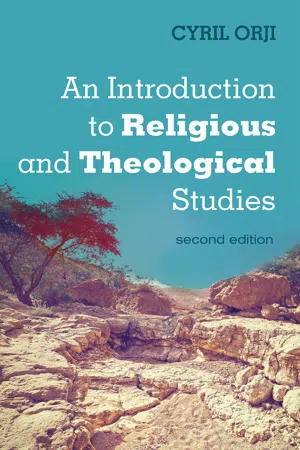![]()
Part I
Christian Theology and the Three Abrahamic Religions
![]()
1
The Complex Matter of Religion
The phenomenon that goes under the umbrella term “religion” is one of the many ways individuals and communities engage in human search for meaning. From the beginning of humanity, religion has served as a unique response to the fundamental human question, “Who am I?” At a recent conference on the environment and economic sustainability in Copenhagen, Denmark, a young man from Brazil gave a fascinating account of their primary school curriculum. According to this young man, at a very early age Brazilian children are exposed to three different cultures: the cultures of the indigenous peoples of Brazil, African cultures, and Portuguese culture. The first African slaves arrived in Brazil in the sixteenth century to replace the indigenous labor. At the time Brazil was occupied by the Portuguese crown. Modern Brazilians trace their ancestry to at least one or two of these cultures that have mixed over time. What they are trying to find out in essence is their roots—who they are as Brazilians. We all confront the same dilemma as humans: Who are we? Where do we come from? And why are we here? For some, this is a question about the mystery of life.
Questions about the mysteries of life are much more common during times of distress, war, famine, earthquake, or other disasters. On January 12, 2010, a 7.0 earthquake left about 230,000 Haitians dead and about 1.3 million others homeless. A 9.0 earthquake hit Japan the following year in March, triggering a tsunami that left hundreds of people dead. The tsunami also hit parts of Japan where their radiation plants were located, setting off a radiation crisis in the region. The impact of this calamitous event was felt beyond Japan. For example, the tsunami brought about 1.5 million tons of debris from Japan to the west coast of the United States, fueling further fears of radiation crisis and irregular climate patterns. Natural disasters and wars in general produce calamities and destruction. The instability they produce can and does raise serious questions about the human person, the world, and our place in it.
The question “Who am I?” is ultimately related to the matter of our place in the world—the question of human agency. The question of human agency is a fundamental “religious” question: How are we related to the earth or planet? In 1991 what used to be Yugoslavia collapsed. The breakdown led to a series of armed conflicts from 1991 to 2001 (the Balkan War) between then Yugoslavia’s multiethnic groups—Serbs, Bosnians, Croats, etc. As the country disintegrated the world saw grotesque pictures of massacred innocent people, particularly women and children. The International Court of Justice called the massacre of Bosnian Muslims at Srebrenica in 1995 an act of genocide. By the time the war was over more than 200,000 people had lost their lives and a thousand others had been displaced from their homeland. The end result was a divided Yugoslavia federation that split along ethnic lines: Serbia, Slovenia, Bosnia, Croatia, Kosovo, and Macedonia. In situations such as these, when people are faced with questions that touch the core of their existence, they turn to religion for answers. We return to our question of human agency that religion addresses: How are we related to one another? How are we related to the planet? What does our relationship to the planet and to others say about who we are—question of personal identity?
The way Western cultures conceive personal identity is somewhat different from the way non-Western cultures conceive it. Although those of us in the West acknowledge that there are many factors (family, school, environment, etc.) that shape who we are, we still think of personal identity as a rather personal thing to be resolved by the individual. The individual self is often conceived as an independent and autonomous entity. But that is not so in non-Western cultures where the emphasis is on community—personal identity is a rather communal thing. We should keep in mind that the difference between the Western conception of personal identity and the non-Western conception of personal identity invariably affects their respective definitions or conceptions of the activity we call “religion.”
What Is Religion?
The activity we call religion is an ancient human phenomenon that predates Western culture itself. Before Christianity and Islam, indigenous peoples all over the world were always religious, although they may not have had a word to capture that religious activity. Indigenous peoples lived their lives in the particularities of their culture, community, and language, and expressed their belief in divine realities in the context of these. Religion, for them (if we may use the term), was not limited to worship of deity, but was rather for them a way of responding to the challenges posed by the harshness of their environment and the world at large. Religion and culture were, for them, one and...
